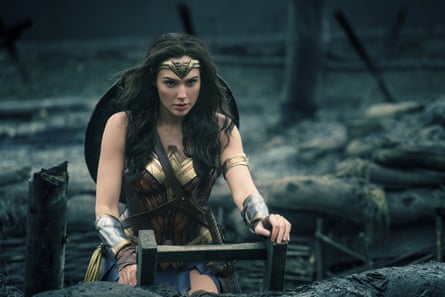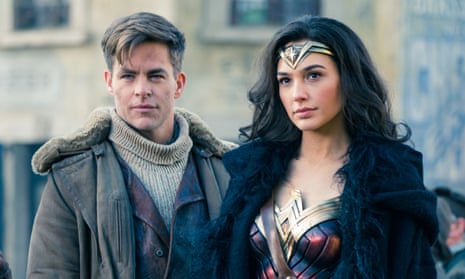It’s fair to say that Warner Bros’s nascent DC Extended Universe hasn’t exactly got off to the best of starts, with both Batman v Superman: Dawn of Justice and Suicide Squad suffering sustained critical drubbings when they were released last year. So it comes as something of a shock that Patty Jenkins’s Wonder Woman, the studio’s third film of an ambitious slate of a dozen or more interlinked comic book movies based on the DC comics back catalogue, is suddenly being hailed as the greatest superhero flick since The Dark Knight.
Can this film really be so good? Here’s a chance to give your verdict on the movie’s key talking points.
The first world war setting
Wonder Woman’s story is credited to screenwriter Allan Heinberg, Zack Snyder and Jason Fuchs, which seems strange as a new Hollywood Reporter piece suggests Jenkins herself came up with the idea of taking the Amazonian princess back to the first world war. Whoever deserves the credit – doesn’t it work a treat? Wrenching Wonder Woman from the horrors of the 21st century DCEU allows us to forget all the raging testosterone and heavy metal angst of Dawn of Justice, her debut appearance. Instead of being smashed round the face with a gaggle of little-known, thinly drawn supervillains for two hours (hello, Suicide Squad), we get a simple origin story that takes its own sweet time to properly introduce the superhero.

In the detail and development of this unvarnished story, – Wonder Woman leaves her magical island home to take down Ares, the god of war, who she assumes must be inspiring the evils of the Great War – we discover everything we need to know about Diana of Themyscira: her bravery, fortitude, stubborn streak and most importantly, her almost unbounded capacity for selflessness. The horrors of human conflict turn out to be the perfect backdrop to Diana’s introduction, the suffering of mankind the consummate catalyst for her arrival in the world of men.
Gal Gadot’s Wonder Woman
Might Jenkins’s movie mark the most perfect piece of superhero casting since Christopher Reeve first pulled up his underpants on the wrong side of his trousers? The actor effortlessly blends statuesque grace with warm-hearted resolution, and she and Chris Pine have genuine chemistry – though the Star Trek regular is hardly alone. Gadot seems to be the kind of actor who improves the performance of everyone around her. Just as Reeve did, she leaves space for a cavalcade of fabulous character actors – Lucy David, Ewen Bremner and Saïd Taghmaoui were the stand-outs for me – to do their thing. Could she play this role for decades if the writing remains this good?
The shift in tone

What a relief to watch a DC movie that’s actually funny. Naysayers might argue that the brutal and intense early DCEU films at least marked themselves out as different from the lighter-toned Marvel movies. And sure, Christopher Nolan’s excellent Dark Knight trilogy was not exactly drenched in comic moments. But any superhero cinematic universe that hopes to team an ancient Greek demigod with a flying alien and a guy who dresses up like a giant bat is surely going to need a few jokes sooner or later. Wonder Woman has huge amounts of fun by pitching Diana as a fish out of water in early 20th-century London, and gets even more joy from ripping the mickey out of ridiculous weapons such as the lasso of truth – without, crucially, undermining the brio with which our hero wields them. Marvel has covered similar territory before, of course – it’s no surprise to learn that Jenkins was once set to direct the sequel to Thor. But who can blame the studio for cribbing a little from its more successful rival, especially when the results are this effective?
The critical acclaim
Is Wonder Woman really the greatest comic book movie of all time? That 97% “fresh” rating on Rotten Tomatoes puts Jenkins’s film ahead of The Dark Knight (94%), Spider-Man 2 (94%) and Iron Man (both 94%), Superman (93%) and Avengers Assemble (92%). Might the movie be benefiting from the low bar set by Dawn of Justice and Suicide Squad, or simply a palpable sense of relief that Warner/DC hasn’t dropped the baton a third time in a row? Given previous outrage from hardcore DC fans towards the brickbats thrown at its predecessors, might some critics even have upped their point score by the odd digit or two just to show they’re no Marvel stooges?
The next step
Wonder Woman’s triumph perfectly sets up Justice League, due as soon as November and with Marvel stalwart Joss Whedon in the director’s chair following Snyder’s decision to step away due to his daughter’s death. The true test of that movie will be whether it can capitalise on all the goodwill generated for the DCEU by Jenkins’s movie. Is this a genuine cinematic universe, with each episode both standing alone and increasing our knowledge and enjoyment of the wider picture? Or might Justice League slip back into the lazy, short-sighted approach to world-building that characterised Suicide Squad and Dawn of Justice?

Comments (…)
Sign in or create your Guardian account to join the discussion